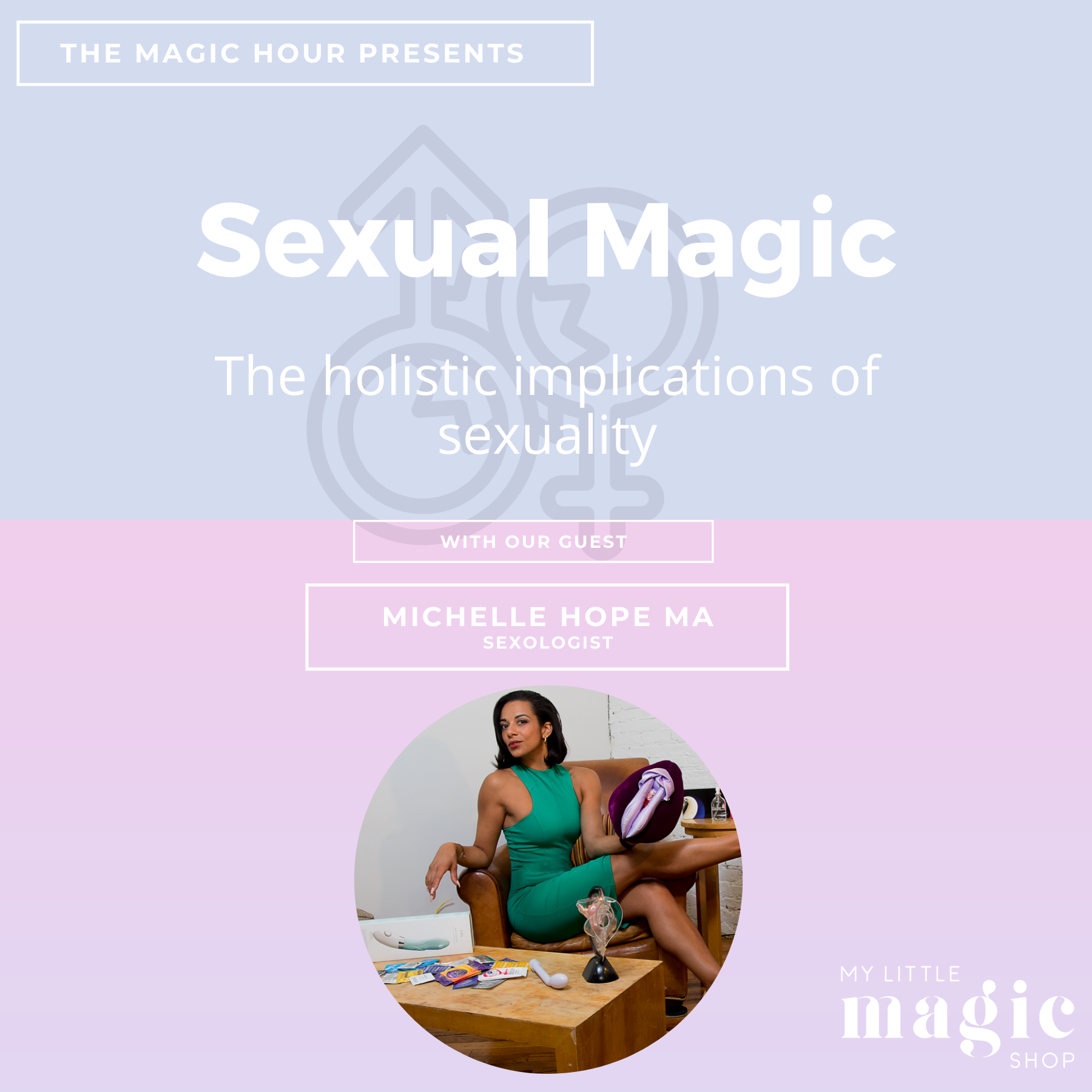The Holistic Implications of Sexuality with Michelle Hope
•Posted on January 10 2021

On this week's The Magic Hour, Shereen will be talking about Sex Magic with the extraordinary Michelle Hope. She is a dedicated sexologist, educator and activist with over 15 years of experience delivering impactful, informative lectures and seminars focused on the holistic implications of sexuality on one’s personal life. Are you ready to make your own magic?
Show Notes:
In this episode, we have invited Michelle Hope, a dedicated sexologist, an educator with 15 years of experience delivering impactful, informative lectures. Today, Michelle
Michelle as a Sexologist
[1:59]
A sexologist is someone who studies human sexual behavior. What Michelle does is she looks at sexuality from the perspectives of how it impacts almost everything we do throughout our daily lives. Gender norms and how young people perceive gender issues or what masculinity looks like. Those are rooted in sexuality issues. Michelle looks at wage gaps and you know why women aren't paid as much as men. She also does the pleasurable parts of sex ed and teaches about masturbation and pleasure and communication. Teach about consent and rape culture.
What led Michelle into being a sexologist?
[4:26]
According to Michelle, she would identify herself as a queer black woman. Her mother is Caucasian and is a lesbian and her father is black. Michelle grew up in Indiana. Race has always been a part of her experience.
[8:24]
While Michelle’s mother was a feminist and was an activist, they didn't really talk about sex in the home because her mother was a closeted lesbian. So love was love, but when it came to sex, it just wasn't much conversation. But this goes to show how sexuality really just bleeds into every aspect of your life, whether it's the norms of gender roles, male and female roles, or the impact of seeing your parents.
[11:08]
I have taken these experiences and now I'm putting them into practice to help other people heal in a healthy way.
[14:47]
Michelle studied African-American history in undergrad and human development. Then Michelle took her master's in marriage, family therapy, with the emphasis on African-American family studies cause she knew her community needed this.
[17:56]
Michelle designed the sex-ed program to implement a culturally competent sex education program that is inclusive and medically accurate as well as age-appropriate, which is really a big deal. And then Michelle does co-training for coaches because people just don't know anything about their own sexuality.
Generational Poverty
[18:56]
There's this thing called the sexual web of poverty. What it looks at is poverty globally and who it impacts the most, and it impacts black and brown women, whether it's being trafficked. And this is on a global level being trafficked because the family is so poor that they end up choosing to sell their children, their daughters, which does happen.
[22:26]
This is rooted in sexuality. The idea that black men are violent, that is white fragility, that's rooted in slavery. And the idea that even pornography, the big black cock, that is a myth that is rooted in white supremacy.
Bringing Holistic practices into work
[24:29]
It's about really honoring your sexuality and whatever that looks like because when you're honoring your sexuality, you're honoring yourself. It's rooted in connecting through meditation and mindful practice of self-pleasure.
[28:31]
Through peaceful protest or teaching classes in the park, Michelle taught a class during the week of action for Brianna Taylor to help people make the connection between reproductive oppression and why their community throughout history and America so easy to brush issues of Brianna Taylor under the rug. Because there is a direct connection on how black women in the United States have always been below the bottom of the barrel and their bodies have been used for black and brown women for experimentation exploitation. They came up with the idea of creating a class that would combine social justice and sex magic.
Top 3 things to add to your self-care routine to feel more connected to your sexuality:
[31:47]
First, make up your self-sex routine. This is vital to anybody's just mental health period. When you orgasm, you release oxytocin in the brain, which reduces stress levels, which can help you sleep.
[35:17]
Another thing is Wow masturbating, visualizing, or wow, orgasming, visualizing that energy from the sacral chakra coming up and lighting up all of the chakras all the way to the top.
[36:38]
Then you can then step into the more sexual part. It's such a thin line that if you just start allowing yourself to just thinking sexy, you don't even have to touch your genitals or your body. Just your whatever makes you feel as sexy as you light your candle, you have some music thing, whatever it is for you, you just got off the bath or you're in the bath, just sit in that moment.
Consistent activity that Michelle does to maintain a sense of inner peace
[41:24]
Meditation. She usually holds her heart and oftentimes her hand on her sacral chakra and just asks herself “how am I feeling today?”, reminding herself that she is loved and thanking God for her divinity.
The most inspirational person for Michelle
[44:21]
Kenny was his name, I became his independent living skills. Coach. Michelle would help him change all the things. And what it taught Michelle was that you cannot put limitations on someone based on their exterior, whether it be able to color of skin, language barrier, because there is a bright mind in that person, regardless of what our implicit bias might be telling us based on what societal norms have indoctrinated into our understanding of what is normal or what is good.
Follow Michelle on Instagram and Twitter:
@mhsexpert
Comments
0 Comments
Leave a Comment